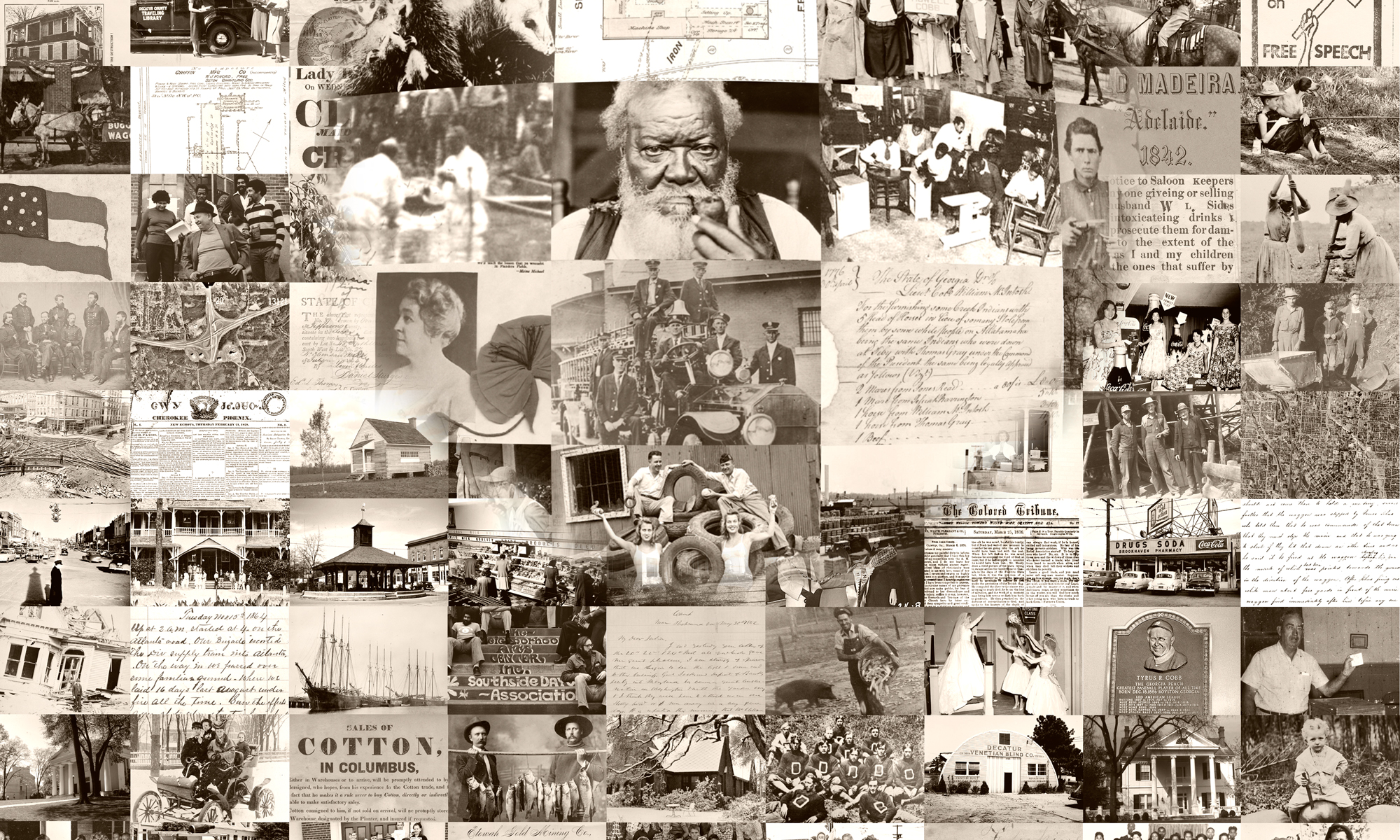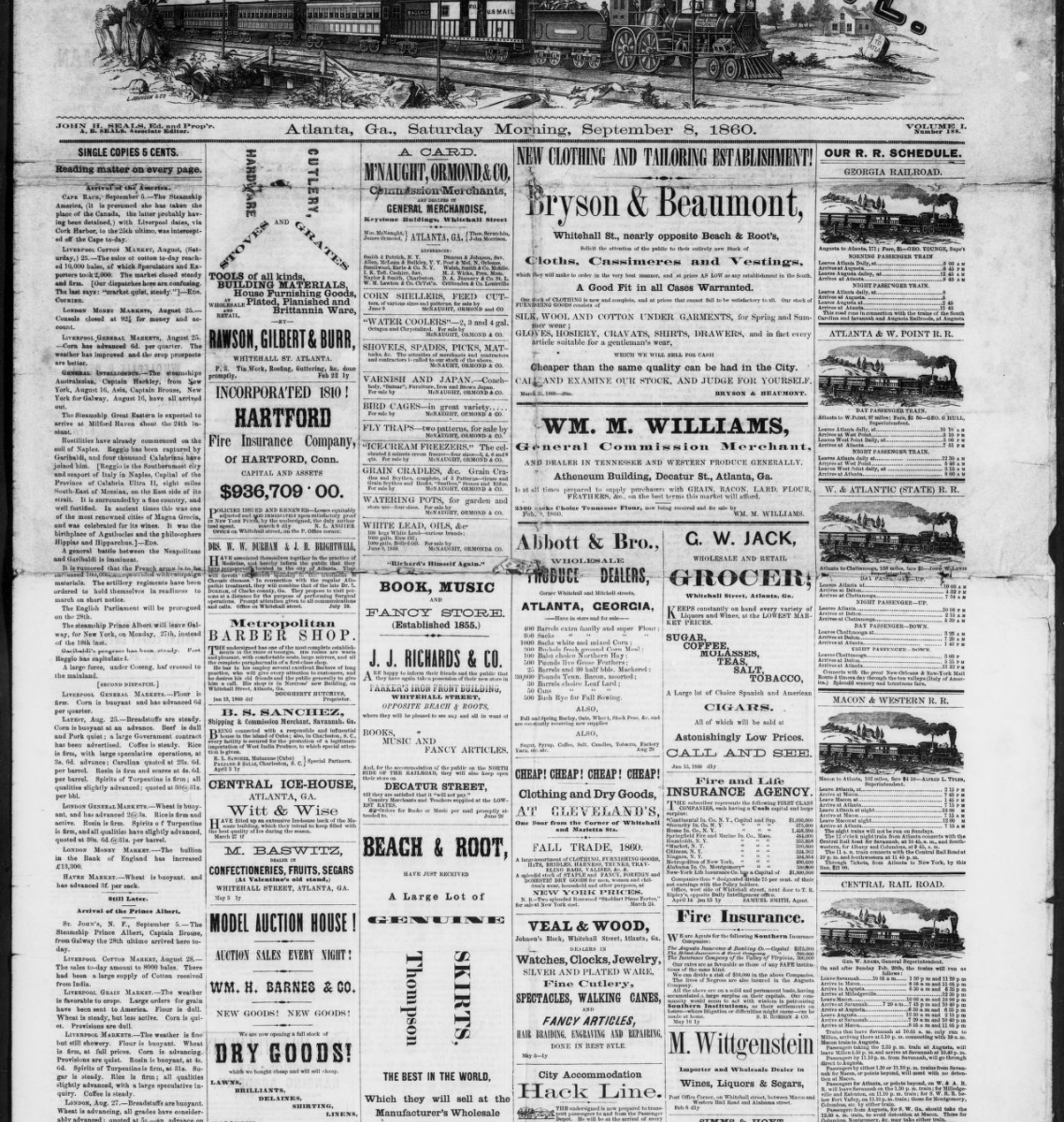Six institutions are recipients of the fourth set of service grants awarded in a program intended to broaden partner participation in the Digital Library of Georgia (DLG). The DLG solicited proposals for historic digitization projects in a statewide call, and applicants submitted proposals for projects with a cost of up to $7,500.00 The projects will be administered by DLG staff who will perform digitization and descriptive services on textual (not including newspapers), graphic, and audio-visual materials. This subgranting program was presented the 2018 Award for Excellence in Archival Program Development by a State Institution by the Georgia Historical Records Advisory Council (GHRAC).
The recipients and their projects include:
- Athens-Clarke County Library Heritage Room (Athens, Ga.)
Digitization of 8 bound ledgers dating from 1902 to 1907, the earliest section of their City of Athens Police/Mayor’s Court Records, which reflect the cultural, political, social, geographic, and economic diversity of the Athens community and interaction with law enforcement and justice system.
- Bartow History Center (Cartersville, Ga.)
Digitization of a portion of a collection of county documents that include topics such as: guardianship (1850-1929), indentures (1860-1929), lunacy (1866-1929), pauperism (1866-1879), land grants/deeds (1866-1929), and other records. The records were created by court officials to document legal proceedings and transactions.
- Booker T. Washington High School (Atlanta, Ga.)
Digitization of Booker T. Washington High School annuals dating from 1931 to 1968 that document the evolution of African American secondary education, and feature the attendees of the first public high school for African Americans in the state of Georgia. Some notable alumni from the school include Martin Luther King, Jr., Lena Horne, Nipsey Russell, and Louis Wade Sullivan.
- Fulton County Schools Archives (Hapeville, Ga.)
Digitization of Superintendent’s Annual Reports dating from 1929 to 1977, which contain demographic information pertaining to the growth of the school system located in and around Atlanta. The oldest portion of this collection provides evidence of a largely rural and segregated district during the Great Depression, while the latter portion is a culmination of the movement to integrate the schools after the Brown v. Board of Education decision of 1954, a process that lasted seventeen years.
- Thomasville History Center (Thomasville, Ga.)
Digitization of the correspondence and diaries of Hazel Beamer Cutler, a Broadway entertainer, and her family friend Candace Wheeler, founder of the American decorative arts movement, both of whom lived in southwest Georgia.
- University of West Georgia Special Collections (Carrollton, Ga.)
Digitization of publications from the Carroll County Genealogical Society that reflect the settlers of Carroll County in west Georgia after the Indian Springs Treaty of 1824, and inventories of burial sites for both whites and African Americans throughout the county.
Preference in the selection process was given to proposals from institutions that had not yet collaborated with the DLG. Bartow History Center, Booker T. Washington High School, Fulton County Schools Archives, and the Thomasville History Center are all new partners for the DLG.
Sheila McAlister, director of the Digital Library of Georgia notes: “The subgranting program continues to be a success. We’ve broadened the DLG partner base, and the collections selected by our review team reflect the state’s diversity. The materials document schools in Atlanta and Fulton County, diaries and correspondence from Thomasville, genealogy in Carroll County, and county and court records from Bartow and Clarke counties. These materials serve a wide audience of researchers.”
About Athens-Clarke County Library Heritage Room
To learn more about the Athens-Clarke County Library’s Heritage Room, call (706) 613-3650, ext. 350. The Athens-Clarke County Library is located at 2025 Baxter Street in Athens, Georgia.
Visit http://www.athenslibrary.org/athens/departments/heritage.
About Bartow History Center
The Bartow History Museum, located at 4 East Church Street in downtown Cartersville, Georgia, documents the history of northwest Georgia’s Bartow County. Visit https://bartowhistorymuseum.org/.
About Booker T. Washington High School
Booker T. Washington High School, named for the famous educator, opened in September 1924 under the auspices of the Atlanta Board of Education, with the late Charles Lincoln Harper as principal. It is the first public high school for African-Americans in the state of Georgia and the Atlanta Public Schools. The building is listed on the National Register of Historic Places. Visit https://www.atlantapublicschools.us/btw.
About Fulton County Schools Archives
The Fulton County Schools Archives preserves and maintains a wide range of historic materials such as board minutes, school yearbooks, and audiovisual recordings while serving the public as a repository for these historical collections. Visit http://www.fultonschools.org/en/divisions/acd/learnteach/Pages/FCS-Archive.aspx.
About Thomasville History Center
The Thomasville History Center is a non-profit community organization dedicated to ensuring that the appreciation of Thomasville’s unique history remains an intrinsic and unbroken thread connecting the past and future through settings that advance the town’s story. Visit https://www.thomasvillehistory.org.
About University of West Georgia Special Collections
Special Collections in Ingram Library gathers, preserves, and publicly shares primary sources to advance teaching, learning, scholarship, and community engagement in service to the University of West Georgia, regional community, scholars and members of the general public. Visit https://www.westga.edu/library/special-collections/.
About the Digital Library of Georgia
Based at the University of Georgia Libraries, the Digital Library of Georgia https://dlg.usg.edu/ is a GALILEO initiative that collaborates with Georgia’s libraries, archives, museums and other institutions of education and culture to provide access to key information resources on Georgia history, culture and life. This primary mission is accomplished through the ongoing development, maintenance and preservation of digital collections and online digital library resources. DLG also serves as Georgia’s service hub for the Digital Public Library of America and as the home of the Georgia Newspaper Project, the state’s historic newspaper microfilming project.


